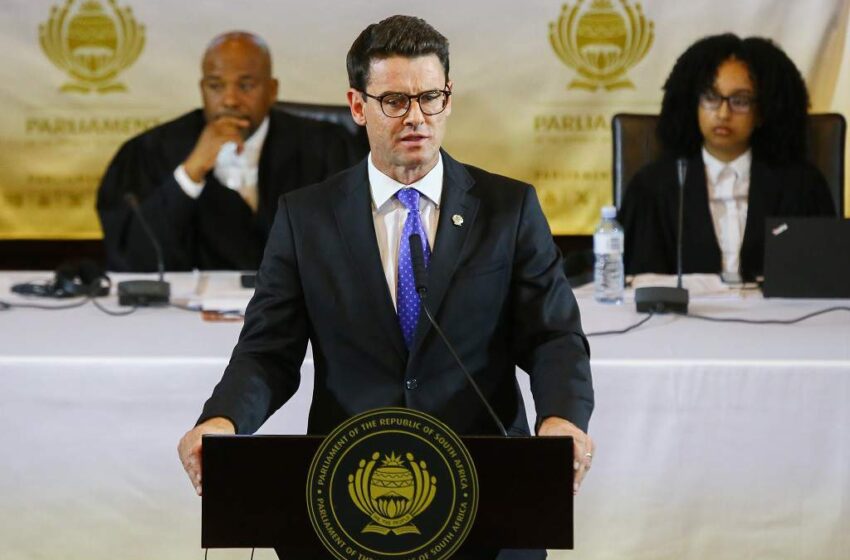Key takeaways from Ramaphosa’s statement on sacking Andrew Whitfield

Who is Andrew Whitfield? Meet deputy trade minister sacked by Ramaphosa
President Cyril Ramaphosa has addressed the growing controversy surrounding the dismissal of Deputy Minister Andrew Whitfield, offering a firm and constitutionally grounded justification.
In his official statement, Ramaphosa cited a breach of Cabinet protocols as the primary reason for the removal, reinforcing the importance of discipline within the Government of National Unity. The President’s remarks aim to restore confidence in the coalition’s stability while asserting his executive authority. His message sends a clear signal on the boundaries of political conduct in South Africa’s evolving governance structure.
1. Why Was Andrew Whitfield Removed?
President Ramaphosa clarified that Andrew Whitfield was relieved of his duties for embarking on an international trip—specifically to the United States—without following the required government protocols or obtaining the necessary clearances. This unilateral action, the President noted, contradicted established norms expected of executive members and undermined Cabinet discipline. The decision to remove him was made to preserve the integrity of the executive and to set a precedent that all members must comply with governance standards, regardless of political affiliation.
2. How Did the Action Affect the Government of National Unity?
Ramaphosa emphasized that Whitfield’s conduct breached the cooperative ethos underpinning the Government of National Unity (GNU). He said the GNU, being a broad coalition of political parties, depends heavily on trust, communication, and collective accountability. Any act that circumvents these foundational principles threatens not just internal relations but the effective functioning of the entire administration. The President described Whitfield’s move as a serious violation that could not be ignored if the GNU is to maintain credibility and cohesion.
3. Is the President Allowed to Sack Deputy Ministers Unilaterally?
Yes, and the President reinforced this point emphatically. Ramaphosa stated that under South Africa’s Constitution, he alone holds the authority to appoint and dismiss ministers and deputy ministers. While coalition agreements may guide political cooperation, they do not override constitutional powers. This part of the statement served as a direct rebuttal to critics suggesting that coalition partners should be consulted before such decisions. Ramaphosa’s message was clear: executive authority must remain constitutionally grounded, not politically negotiated.
4. What Did Ramaphosa Say to the DA After the Sacking?
Despite the tension, the President maintained a conciliatory tone, inviting the Democratic Alliance (DA) to submit a new candidate for appointment. He framed this as a commitment to the GNU’s continued stability and the DA’s role within it. Ramaphosa acknowledged that disagreements may arise in coalition settings, but stressed that they must be resolved within a framework of mutual respect. The invitation was a strategic gesture aimed at de-escalating political fallout while keeping the GNU intact.
READ ALSO
South Africa: What Cyril Ramaphosa said about Andrew Whitfield’s sack
Who is Andrew Whitfield? Meet South Africa’s deputy minister sacked by Ramaphosa
5. Why Is Protocol Important Within the GNU?
Ramaphosa argued that strict adherence to protocols is essential to the GNU’s success. With various parties working together, there must be clear boundaries and agreed processes to ensure order. Unauthorized decisions or actions—like Whitfield’s solo trip—risk creating confusion, diplomatic embarrassment, or even policy contradictions. By reinforcing discipline and communication channels, the President underscored that the GNU cannot function on fragmented actions or party-centric agendas.
6. Was the President Reacting to DA Pressure?
In a carefully worded portion of the statement, Ramaphosa dismissed any notion that his decision was influenced by external pressure or political threats. Without naming the DA directly, he said threats would not be tolerated and that national leadership decisions would always be based on constitutional principles and the public interest. This was interpreted as a response to the DA’s earlier objections and warnings that the move could destabilize the coalition.
7. What Is the Way Forward?
Looking ahead, Ramaphosa called for unity and maturity from all GNU partners. He said the future of the coalition depends on mutual respect, clear communication, and adherence to the terms agreed upon when the coalition was formed. While reaffirming his openness to collaboration, he made it clear that cooperation should never come at the cost of discipline or constitutional clarity. His final remarks focused on preserving governance integrity, even in a politically complex coalition environment.

